- Home
- Rosanne Hawke
Spirit of a Mountain Wolf
Spirit of a Mountain Wolf Read online
About this Book
He heard the man's voice in a low murmuring—he must be telling her a story. Then he heard the bells Tahira wore. He closed his eyes, imagining the way she turned, her hands opening and closing to show the path of the story, her feet making the bells ring with joy. There was silence, another low murmur, an exclamation, then a shriek.
Razaq raced to the door and pounded on it. "Stop. What are you doing?"
Murad was there instantly, and as Razaq was dragged away, he could hear Tahira screaming his name. . . .
"You are like a mountain wolf, so strong and proud."
Fourteen-year-old Razaq Khan lives in the Pakistani tribal area of Kala Dhaka, Black Mountain. When an earthquake devastates his family home, Razaq's dying father tells him to travel to his uncle, Javaid. A man preying on orphans lures Razaq to the city with the promise of finding his uncle. But it is not long before Razaq realizes he has not been helped at all—he has been sold into slavery.
Losing hope while in captivity, Razaq meets Tahira, a young girl suffering just like him. Razaq feels a surge of something new—love. Author Rosanne Hawke delivers a heart-wrenching story about friendship, sacrifice, and the power of the human spirit, a mountain wolf's spirit, to overcome sexual exploitation, the most harrowing of circumstances.
About the Author
Rosanne Hawke is an Australian author of over twenty books, among them Shahana: Through My Eyes; The Messenger Bird, winner of the 2013 Cornish Holyer an Gof award for YA literature; Taj and the Great Camel Trek, winner of the 2012 Adelaide Festival Children’s Literature award; Marrying Ameera, a Children’s Book Council of Australia Notable Book; and Soraya the Storyteller, which was shortlisted in multiple Australian awards in 2006. She was awarded an Asialink Fellowship to write in Pakistan in 2006 and the Carclew Fellowship in 2008. Rosanne was an aid worker in Pakistan and the United Arab Emirates for ten years and now teaches Creative Writing at Tabor Adelaide, South Australia. She lives in rural South Australia in an old Cornish farmhouse with underground rooms.
Contents
Cover
About this Book
About the Author
Title Page
Dedication
* * *
Chapter 1
Chapter 2
Chapter 3
Chapter 4
Chapter 5
Chapter 6
Chapter 7
Chapter 8
Chapter 9
Chapter 10
Chapter 11
Chapter 12
Chapter 13
Chapter 14
Chapter 15
Chapter 16
Chapter 17
Chapter 18
Chapter 19
Chapter 20
Chapter 21
Chapter 22
Chapter 23
Chapter 24
Chapter 25
Chapter 26
Chapter 27
Chapter 28
Chapter 29
Chapter 30
* * *
Acknowledgements
Note to Our Readers
Copyright
More Books from Scarlet Voyage
For those children whose lives have been traded
Chapter 1
Abdur-Razaq Nadeem felt the rumble in the earth—like a truck rushing underground. Then, an eerie heaviness, a sound almost, but there were no words to describe it—like a mourning song with no music. He stood still by the stream, the water in the buckets he held sloshing even though he wasn’t moving them. Then the ground roared and shot up beside him as if it were a wave. He fell as another wave rose and his buckets rolled from his hands. This time the stream threw water out at him. He crawled away from the bank, fighting to keep his balance. The ground was a giant blanket shaken in the wind. Razaq reached out to grab a branch, but the tree suddenly disappeared. It was sucked underground in front of him. He backed away, tried to stand, fell again. In the end, he cowered on the ground with his hands over his head as wave after wave of the earth slithered under him and tossed him high.
The roaring had stopped but Razaq couldn’t remember when. He looked around; he didn’t trust his legs to stand. Boulders from the mountain had landed in the stream, and he was sure the water was flowing in a different direction now. He kneeled and saw a ravine where before there wasn’t one. If he had walked just a step, he would have fallen a thousand feet. He vomited on the ground.
He couldn’t see the buckets anywhere. His mother would be angry with him. They were the only way to bring water from the stream to the house each morning, and they had cost five rupees in the bazaar in the village down the mountain. It would take him all day to go down for more, if his father had the money.
Razaq began crawling up the slope to his house. The last time the earth had moved, he had been tiny; he remembered the panic, his mother running to pick him up and cradle him beneath her. The roaring had passed quickly that day, and there had been little damage.
After a while, Razaq tested his legs: they felt wobbly but he managed to stagger up the pathway home. When he reached the clearing, he thought he’d lost his way. His house wasn’t there. The vegetable plot his mother nurtured had been uprooted. Peepu, their prized ram, lay on the ground. There was something wrong with the way his heavy hoofs stuck out. Razaq ran forward. Peepu was lifeless, his long horns broken. Razaq couldn’t see the lambs or the goats. Then he noticed a rock that had fallen from the mountain. A sheep was caught under it. Peepu may have tried to butt the sheep out of the way and the rock had hit him first.
It was then that Razaq realized why he couldn’t see the house. He stared at the stones and rocks that covered what had been his mud, stone, and shale home. His mother would have been preparing parathas, his sisters still sleeping. Ramadan had begun, and he and his father had eaten before sunrise. He stood there, his mind in a mist; he couldn’t think what it all meant, didn’t dare to.
A charpoy, a string bed, sat the right way up on the ground, as if his father had brought it outside to lie in the sun. Then Razaq heard a groan. He followed the sound onto their terraced farmland.
“Abu!” Razaq could see his father’s legs. The trunk of a tree straddled his chest, and his arms were caught under it, too: he must have tried to shield himself. “Abu!” Razaq put two arms around the trunk, straining to shift it, but it didn’t budge.
His father opened his eyes. “Alhamdulillah, beta. Praise God, son, you are safe.” Razaq had to bend close to hear. “I was worried for you.”
“I am fine, Abu ji. I will get help.”
“Nay, do not go.”
“But, Abu . . .” Razaq sized up the tree. Two men maybe, plus himself, might lift it.
“Listen.” His father coughed, then groaned. “Find your Uncle Javaid. Go to Rawalpindi . . .”
“But—”
“. . . money in my pocket . . . bus from Oghi . . .”
The breath in his father’s throat sounded like a snake’s. Razaq had heard that sound before when his grandmother had died.
“Ji, Abu.” Razaq kissed his father’s face. The sound in his father’s throat stopped.
Razaq never found his mother and sisters. He scrabbled at the hill of rock where his house should have been, but without a tool, there was nothing he could do. No one could move a mountain with his hands. He found a branch in the forest and kept picking at the smaller rocks with it, but by nightfall, he was no closer to the house itself. Energy born of shock had carried him through the day, and now it disappeared. He had no sense of how long he sat there keening.
In the night, the roaring came again. He hid behind Peepu. The ground didn’t move as badly or open up this time.
In the m
orning, a man in a black turban with a long beard found him. Razaq hadn’t eaten for thirty hours, and he shivered in the morning cold. He eyed the rifle the man held, but saw only peace in his eyes.
“Are there more of your family . . .” The man left the sentence unfinished.
Razaq shook his head faintly.
The man stroked his beard. “A jao, come with me.” Then he said, “This is what comes of not submitting to Allah.”
The man was his elder, so Razaq didn’t say how his father said his prayers and went to the village mosque most Fridays. Razaq had begun to go, too, to join the men. What more did God require? His father always said that to live a good life, to work and look after your family and animals, was submitting to God. Even when Razaq’s little brother, Tameem, had died, his father accepted God’s will. Still, Razaq knew his father would agree with the man that God had brought the earthquake. Uncle Javaid would have provided some scientific reason. His brother’s new thoughts often made Razaq’s father argue with him and tell him he was losing his faith. He had told Uncle Javaid last time he was here that the earth was just as flat as the last time they had argued about it.
Razaq’s breath caught in his throat when he thought of his father. Never again could he ask him anything or climb up the mountain ridge to the forest with him to hunt. And his mother—she kept him working hard, but he’d never thought what it would feel like to not have her calling him, urging him to do his work well, or trying to kiss him, and cuffing him across the head playfully when he refused. He’d give anything to be walking down to the stream with the buckets to get water for the house. If only he had the time over, he’d never do anything grudgingly for his mother again.
“Here.” The man indicated the path leading down to the village.
Razaq could see a line of people winding along it toward the Indus River that surged thousands of feet below where the village was. Many—men, women, and children alike—were weeping; others stared ahead as if they could still hear the roar of the earth. He wondered how their neighbours had fared; his friend Ardil’s family still lived near them, though Ardil didn’t anymore. Halfway down the mountain, Razaq caught sight of the village or what was left of it. The mud and shale buildings were flattened as though a giant had stomped on them. Boulders had rolled into the smaller stream that ran through the village. Bigger stone houses had been cut in half, and Razaq could see the emptiness inside them.
When he reached the village, he saw boats coming from the western tribal area across the Indus. A jeep full of the khan’s men roared toward the village on the gravel road, creating a cloud of dust. People huddled in groups near the damaged mosque. Some houses still stood, but people were too frightened to go inside. Most, like Razaq, had no house at all.
The man left Razaq with a group of people, and there, Razaq found Mrs. Daud. It was her daughter, Feeba, who he would marry in a few years, but for now she was still young, only twelve. “Auntie ji?” He found himself clinging to Mrs. Daud as if she were his mother, and he was a young boy. Mrs. Daud burst into sobs.
“Auntie ji . . . ?”
“They are all gone. The children in the madrasah.”
Razaq didn’t think he could feel anything else, yet his voice sounded strangled when he asked, “Feeba?”
Mrs. Daud spoke and wept at the same time. “She took the boys to the madrasah. She never came home.” Her voice rose to a wail when she said “home.”
Over Mrs. Daud’s head, Razaq watched more jeeps drive into the village and screech to a stop at the madrasah near the mosque. The second story of the madrasah had collapsed onto the floor below. The jeeps were stacked with bags of flour, salt, tea, sugar, and milk. The men took out shovels and picks.
“Excuse me,” Razaq said to Mrs. Daud. “I must help.”
He felt he had to do something. He couldn’t help his own family, but maybe he could help someone else.
A man handed Razaq a shovel, and they set to digging out the rubble. There were dozens of men helping, yet they found only a few boys alive: those who had hidden under the teacher’s table. None were Mrs. Daud’s sons. There were many dead, and Razaq shifted his mind someplace else so he could work like a buffalo and not think of the bodies they found. Even when Feeba’s body was recovered, he could only stare at her. In the distance, he heard the fresh wails of the mothers as they were told of the deaths.
How would they bury them all by nightfall, the required time? The maulvi’s son, the priest, called for winding cloths from one of the jeeps. Other men had been digging a long ditch, and the bodies were laid in rows; it looked as if a tribal war had been fought and lost.
Razaq saw the khan by the grave site, leaning on his shovel. Razaq approached him.
“Janab, could some men help me lift a tree off my father so I can bury him?” Razaq averted his eyes in respect as he spoke but tried not to look afraid. Everyone knew khans could be moody and might order you killed if they decided you deserved it. But the thought of his father alone on the mountain at the mercy of wild dogs had haunted him all morning, and he kept his chin high.
Something flickered in the khan’s eyes as he looked at Razaq’s face. Then he called to two older boys. “Hussain, Abdul, go with him. Take your shovels.” The order came with a movement of his head and hand.
The boys slung their AK-47s over their shoulders and joined Razaq. He was so tired he felt like dropping to the ground to sleep, but he had to bury his father. As they began to ascend the pathway up the mountain, he looked back to find the khan staring after him.
“Did you lose many in your family?” the shorter boy, Hussain, asked as they walked with slow, long strides.
“All.” Razaq’s tone was terse.
“You should come with us then, shouldn’t he, Abdul?”
Razaq glanced at him. “Why?”
“We are being trained to fight. We keep the mountains safe from militants.”
“Don’t you have a family?” Razaq asked.
“In Swat, I have a family,” Abdul said. “I miss them, but this is good work. One day, I shall make some money and send it back to them.”
“I don’t want to fight,” Razaq said.
All he wanted right then was to do what his father had done, and his father before him: live on the mountain in peace, keep sheep and goats, and grow corn. Marry Feeba, too. He squeezed his eyes shut as the images from the madrasah finally brought the tears.
Hussain and Abdul strode behind him. It wasn’t unusual to see men cry openly when someone they loved died.
The boys grunted and strained as they used the shovels as levers to pry up the tree and roll it off Razaq’s father. Razaq hesitated when he saw his father’s injuries.
“Come,” Hussain said. “We must dig.”
For the next hour, Razaq had no energy to think about what his father had suffered. It was a mercy the ground was soft. They laid his father inside the earth. The boys waited while Razaq checked his father’s pockets and found the purse. He took the tarveez from his father’s neck and tied it around his own; he gently unbuckled the sandals from his father’s feet and put them on. Then they covered him. Razaq brought rocks and laid them on top. That should stop the jackals. He stood and stared at the grave. This was the land his father had worked; now it was his portion. Could he build another house? It seemed too difficult a task.
He thought of the words that were said when baby Tameem died. “Allahu Akbar, God is great,” he murmured.
They heard a wild dog howl.
“We must go,” Abdul said with a quick glance up the mountain. “It is getting late.”
The moon was high when the boys reached the village. Razaq thanked them and sought out Mrs. Daud. She was still awake, laying blankets over plastic on the ground. Her face was tear streaked, and her hair had fallen down. He felt sorry for her: she had lost everyone as he had, but she had rarely gone out of the house, and here she must feel so exposed.
“I was given some chapattis, beta,” she said when she s
aw him. “Here, I kept two for you.”
She handed them to him in a daze. Razaq wasn’t even sure if she knew who he was.
He lay on the ground nearby, wrapped a blanket around himself, and put some chapatti in his pocket to eat in the morning before the fast began. He wished he had his shawl his mother had woven for him. It was much warmer than the blanket.
During the night, a man walked by and lingered near Mrs. Daud. Razaq sat up and the man moved on. He decided then he would stay with her: she needed him, just as his mother would have.
Chapter 2
The next day, two things happened: an army truck trundled into the village, and in its wake came a jeep of aid workers. The villagers called them Angrez. Razaq heard some men saying the Angrez shouldn’t be there, that they would have to leave. Both groups gave out tents. Razaq stood in line at the army truck, but there was much pushing and shoving. Twice Razaq fell out of line—he was not big enough to fight a grown man, and besides, he had been taught to respect his elders. To see men acting like this troubled him. Some men took two tents. Finally, by persistence alone, Razaq managed to get one for Mrs. Daud. With it came a saucepan, a spoon, and two tin cups.
Mrs. Daud gave him a small smile when she saw the tent. “I did not want to sleep in the cold again. You are a good boy and young enough to sleep in it with me.”
Razaq thought he probably wasn’t, but his lack of mustache made him seem younger. He recalled how Uncle Javaid had shaved his beard off on purpose. “Men in the cities do that,” he had said to Razaq after another argument with Razaq’s father.
The Angrez had set up some tents and were giving out food packages. Most of the tribal men were fighting for flour near the army truck. A soldier stood by with a rifle cocked, shouting at them to form a line. Razaq had never seen mountain men stand in a line and didn’t think much of the soldier’s chances of succeeding. Very few men had gone near the Angrez, and Razaq decided to see what was happening at their tents.

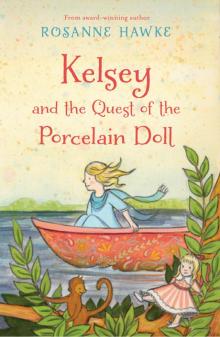 Kelsey and the Quest of the Porcelain Doll
Kelsey and the Quest of the Porcelain Doll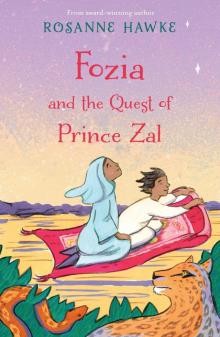 Fozia and the Quest of Prince Zal
Fozia and the Quest of Prince Zal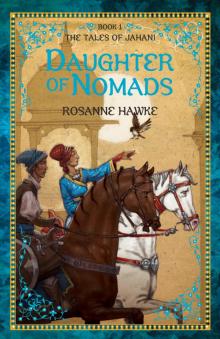 Daughter of Nomads
Daughter of Nomads The Truth About Peacock Blue
The Truth About Peacock Blue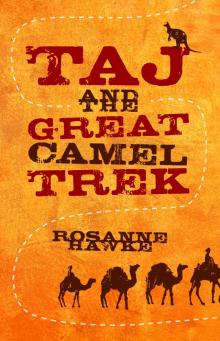 Taj and the Great Camel Trek
Taj and the Great Camel Trek The War Within
The War Within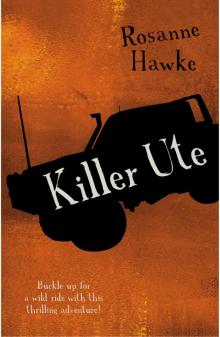 Killer Ute
Killer Ute Shahana
Shahana Kerenza: A New Australian
Kerenza: A New Australian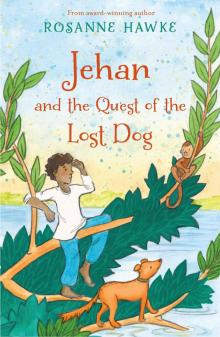 Jehan and the Quest of the Lost Dog
Jehan and the Quest of the Lost Dog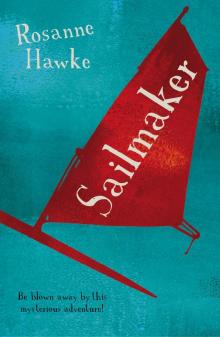 Sailmaker
Sailmaker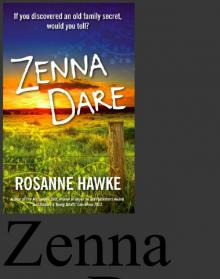 Zenna Dare
Zenna Dare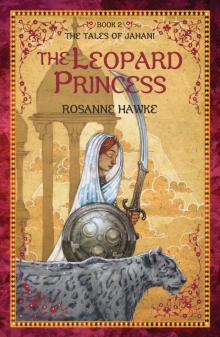 The Leopard Princess
The Leopard Princess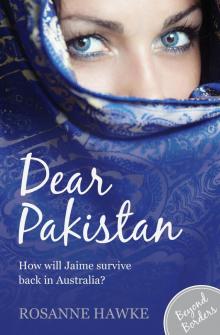 Dear Pakistan
Dear Pakistan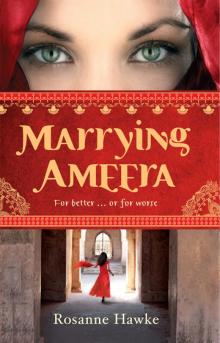 Marrying Ameera
Marrying Ameera Finding Kerra
Finding Kerra Spirit of a Mountain Wolf
Spirit of a Mountain Wolf